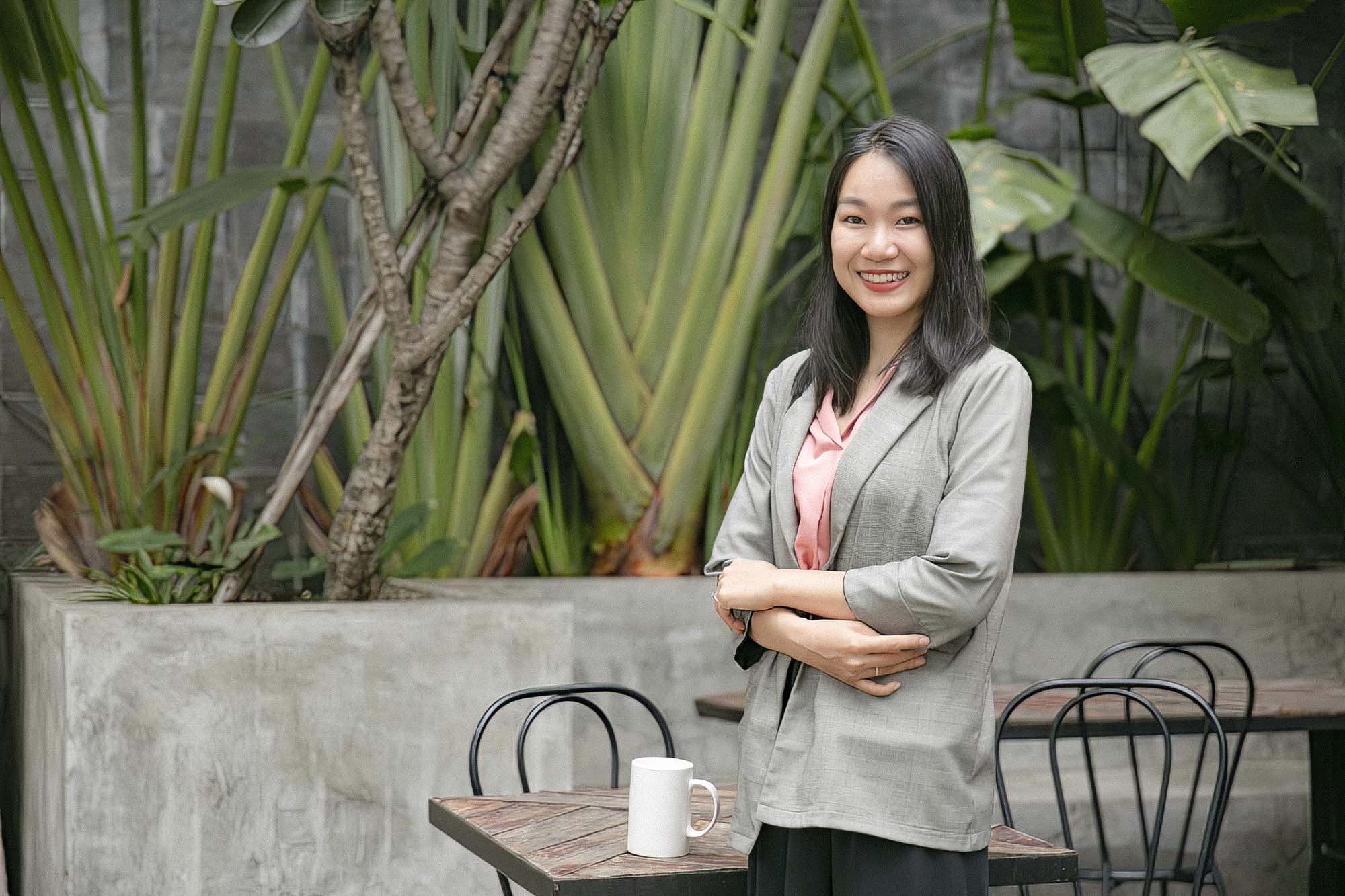Nga Nguyen has many years of experience as Corporate Relations Manager working with more than 200 corporates and SMEs of the British Chamber of Commerce Vietnam and the EU-Vietnam Business Network. Believing technology has a significant impact on the working environment and employer-employee interaction, Nga is currently the Senior Customer Success Manager at EveHR — a company providing platforms to help businesses improve the employee experience.
Having witnessed many challenges and changes in human connection, Nga realizes many existing misunderstandings in Vietnam’s human resource management.
Vietcetera met Nga at the end of March, the typical time of the year when most Vietnamese companies face major personnel changes. The "Great Resignation" economic trend brought by the pandemic has worsened the situation, as workers quit their current jobs to find a new purpose or for safety concerns against COVID-19. This has left many employers short on staff at a very critical time. HRs are more bewildered than ever, and businesses are struggling to retain their talents.
If you run a company or are interested in how to improve employee experience, here are four things Nga Nguyen and the EveHR team suggest to build a company-specific culture of hospitality.
1. Poor job? No, it’s poor working experience.
When we dig deep into the reason for resignation, sometimes workers don’t really quit their job. They may just quit the toxic working environment; some even ‘quit’ their boss.
In fact, many employees still loved what they were doing, but just decided to walk away from the stress of a toxic workplace. The feeling of being uninspired, exhausted, dissatisfied, or excluded may result in uncomfortable relationships between employees and managers.
According to a survey conducted by Gallup in 2021, the top reason for today’s record-high turnover rate is low employee engagement, rather than salary, or how difficult the job is.
Nga shared that although Vietnam is abundant in talents, we have the highest turnover rate in Asia with over 20% across all industries and up to 41.5% during the pandemic. This is partly because of the somewhat 'outdated' working motto — that the customer is king, and that customer's experience is above all, even above the employee's experience. Ironically, a healthcare company may trade off the health of its workers to serve its customers.
Such conflict in the actions and values of some companies is also known as “cognitive dissonance.” In the book ‘Cross-cultural Management,’ Associate Professor Dr. Nguyen Phuong Mai said that this type of conflict can reduce labor productivity, creating "work zombies" who are not motivated and engaged with the company.

Some think that instead of holding on to these "work zombies," hiring new employees would be more reasonable. However, the cost and the time spent on continuously recruiting and training new staff is also significant.
A position can’t be open for so long or it would cause stagnation in the internal operation. Analysis from Gallup also shows that in order to enhance worker productivity, besides talent and enthusiasm, companies need to improve their long-term employee commitment.
Nga concludes that "Upgrading the employee experience benefits not only the companies and their workers but also their customers. It’s a win-win-win relationship."
In fact, working at EveHR and having used its own products, Nga has gained a valuable inside-out perspective of both customer and employee, which is particularly useful for giving better advice to EverHR’s customers and learning from them about what needs to be improved in the platform.
2. “Employee of the month/year” is not enough. We need “Employee of the day/week.”
In the past few years, people tend to share their everyday moments, encouraging a grateful, "appreciating-each-moment" lifestyle on the media and social networks. This is the result of socio-economic change, especially after a prolonged pandemic. People are becoming more aware of the importance of mental health and realize that shooting for the moon is not that really necessary.
Similarly, HR management is shifting to focus on designing short-term employee experience (by day, week, instead of month or year). If an employee has to work hard for a long time without any proper recognition, that effort will turn into resentment. In the long run, resentment can pile up to dissatisfaction.
However, not all efforts have to manifest into great results. Some HBR studies have shown that simply awarding the “Employee of the Year” to certain workers can backfire, increasing the internal competition to unhealthy levels.

To solve this problem, the EveHR team supports businesses to build an effective recognition and rewarding system. Through an app, two colleagues can easily give each other recognition points with compliments, thank you notes, or encouragement anytime, anywhere. The accumulated points will then be converted into e-vouchers, which can be used instantly at certain brands and services like shopping, entertainment, or F&B, depending on each employee’s preferences.
By observing and acknowledging small or large daily contributions of their colleagues, and even their bosses, employees would cultivate the seeds of positive emotions, which can grow into motivation at work. In addition, sending and reading praises to the team members, and sharing each other’s favorite rewards will help increase interaction and strengthen the relationship among the team, especially during the time of remote work.
Giving colleagues the recognition points that are equivalent to a cup of milk tea or coffee is also a nice way to say thank you and appreciate their efforts. With a small gesture like this, you let them know that they are the "Employee of the day," and that they are worthy of the recognition.
3. Compliments are not cliché
In Vietnam, we don’t really have a culture of saying compliments aloud. Meanwhile, criticizing, and judging others’ flaws are so common that they leave mental scars on the workers and eventually scare them away.
There’s an old saying, “An act is worth a thousand words.” Yes, you can acknowledge other people’s efforts by giving them recognition points with compliments and thank you notes as mentioned above. However, sometimes a sincere compliment can be misunderstood as a cliché. Therefore, when it comes to building a culture of rewarding colleagues, EveHR has to flexibly adjust different methods to suit each company’s size and sector they’re working in.
The first solution EveHR suggests is the STAR formula. Based on this formula, the company can give natural, simple, and effective compliments to employees.
STAR stands for:
- Situation: context, or a specific project in which we appreciate others’ efforts.
- Task: their task in the situation.
- Action: what they do to solve the situation.
- Result: the result that they get.
Another suggestion is to set an example and create a sense of normality about complimenting from all levels of management. This is especially necessary if the employees are of an age that is not familiar with the change. Take Nestlé or Suntory PepsiCo for example. EveHR proposed they put more computers in the lunch break area so that people can get acquainted with EveHR's rewarding platform and feel encouraged to use it.
4. There is no one-size-fits-all employee benefits package
Most companies now invest a lot in the employee benefits package, especially in insurance and healthcare services. These benefits are usually highly valued, and most employers think these are enough to satisfy their workers. However, there is no one-size-fits-all. Ten benefits packages could hardly meet thousands of individuals’ needs.
The "tailored" solution to this conflict is flexible benefits, or FlexBen, which allows employees to freely select the benefits package that suits their own preferences and needs.
However, this may raise concerns about benefits package design and budget management for the employers. Fortunately, the companies can now delegate this tricky job to platforms like EveHR to save their time and resources. With state-of-the-art technology and a friendly interface, EveHR is affiliated with hundreds of brands across all fields to provide diverse and up-to-date benefits to the workers.

When seeking a solution to enhance and take the lead in benefits satisfaction, digitalization, and personalization for more than 1000 employees across Vietnam, AIA Life Insurance Company came to EveHR. The FlexA platform project in cooperation with EveHR has given AIA's employees the flexibility to choose their favorite benefits package, which has helped glue all the departments together and stimulate interactions between employees and managers of all levels, thereby improving employee experience and satisfaction at AIA.
EveHR is proud to have accompanied AIA to lead the application of new technology trends in human resource management. AIA is also well-known for its “ideal working environment” for many years now, according to Great Place to Work, USA.

“If we look at other countries in Asia, the rate of applying this flexible benefits trend in Vietnamese enterprises is only about 1-2%, a very modest number compared to the country’s turnover rate.
“However, I believe there will be a drastic change in the near future, especially after the pandemic when employers have become more aware of taking care of their staff’s mental health and personalizing the benefits package,” said Nga.
“And for any major change to happen, everyone needs to keep in mind that a successful company must be one with happy employees. An excellent employee experience brings merit to everyone in the organization - from the manager level to normal employees and even blue-collar workers - then would translate into better service for customers.”
Translated by Bich Tram



